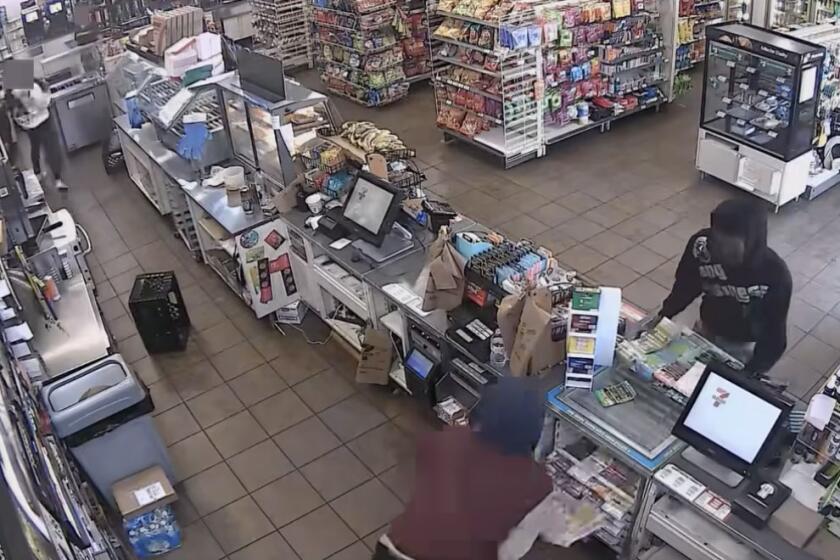Putting Yelp in their rear-review mirror
If readers of my Saturday column about Yelp were to write a review of the crowd-sourced website, it might read something like this:
Yelp is a complete and utter fraud. The reviews are too self-centered, not trustworthy and half the time really don’t make sense. It’s a wonderful populist device … But there’s a nagging feeling that Yelp isn’t as accurate and honest as I want to believe.
Those are real comments from real readers, unfiltered by algorithms or ad contracts. Most of them came from business owners angry, worried or confused about the filter that Yelp uses to screen reviews.
Yelp relies on an algorithm that’s supposed to weed out fake entries but snares countless legitimate ones too.
Business owners smell a rat.
They wrote in droves to complain that good reviews routinely were hidden and bad ones displayed, unless they decided to take the advice of Yelp sales agents and paid to have their companies showcased.
That’s a troubling claim — extortion, some call it — that courts have rejected and Yelp officials have denied.
“Reviews are not filtered according to how much people pay,” Yelp spokeswoman Kristen Whisenand insisted. The algorithm creators don’t even talk to the marketing folks, she said.
Well, perhaps they ought to. Because the marketing folks seem to have figured out how to bypass the secret algorithm when money hangs in the balance.
At least that’s what it sounds like if you listen to the owner of a Venice tutoring firm, whose one-star rating relied on a single customer’s complaint.
That review made it past the filter, but several positive reviews from customers didn’t, he said. Then “Yelp approached me to advertise. I said I couldn’t because I didn’t want to draw attention to my 1-out-of-5-star rating.”
“The salesperson claimed she couldn’t do anything directly, but would let the relevant department know. Suddenly, the negative review was gone and some positive reviews got through,” he said.
“The salesperson has since been calling me repeatedly,” he said. “I’m afraid of what will happen if I don’t advertise.”
::
But muscle-flexing by Yelp sales agents isn’t the only thing holding companies hostage. The forum Yelp gives to angry customers makes the process feel dangerously lopsided, business owners told me.
“We’ve had some very unreasonable guests … [and] their inaccurate, unfair reviews appear prominently at the top of our Yelp page,” wrote Richard Brenner, head of Hugo’s Restaurants. “As a business person, it’s scary.”
While outsiders may find those acerbic 1-star reviews fun to read, “Internet reviews can be a form of consumer terrorism” for small companies struggling to stay afloat, said the owner of a Woodland Hills cleaning service.
The owner of a Temecula property management firm said he thinks “the Yelp concept is good, but it’s been distorted … by unscrupulous people.”
Like the apartment-wrecking tenants who threatened “to ruin us on the Internet” if they didn’t get their security deposit back. Or the man turned down for a rental home who savaged the company on Yelp, then offered “to remove his review for $300.”
San Francisco business consultant Adryenn Ashley hears stories like that every day. “Somebody is always going to be trying to game the system,” she said.
More than 3,000 companies have turned to her Yelp-Sucks website in hopes of repairing their image. “At least once a week,” she said, “I get a call from somebody hysterically sobbing, saying they’re going to lose their business.”
::
Crowd-sourced reviews are here to stay, so consider this a tutorial for folks who need Yelp, use it, but aren’t quite sure they trust it anymore.
If you’re a business owner, don’t bother rallying customers to post positive reviews. Gushy testimonials loaded with superlatives are a red flag to the algorithm’s eye. Amazing! Best ever! Incredible! That screams “somebody asked me to write this.”
Do set up your own free account at biz.yelp.com, with your bio, profile and photos. Respond online to negative reviews with your side of the story. “But you have to be delicate,” Ashley advised. “You make them mad, and all their friends will leave bad reviews as well.”
If you’re a consumer using Yelp to check out businesses, the “sort” option allows you to select which way your choices are displayed. If the business at the top of the list says “Yelp ad” in small print, it has paid to be there. And if you want to find hidden reviews, click on the “filtered” link at the bottom of the list.
Don’t give individual reviewers’ star ratings too much credence; you don’t know what their standards are. But do check the bar graph at the top under “rating details” for a comprehensive snapshot.
And if you, like me, are wondering why your own reviews never seem to remain posted, here’s advice from Jenelle Bossett, a Yelp Elite who’s written almost 400 reviews and plans to add 100 more this year.
She’s a UCLA graduate with a degree in comparative literature who likens review-writing to storytelling.
Bad reviews linger because they tend to have “so much detail, to the extreme sometimes,” she said. The algorithm recognizes them as real; it’s apt to kick out more vague reviews. “Don’t give a place 5 stars and just say you love it. Tell us why.”
You don’t have to have a literature degree. “You can use bullet points,” she said. “Just give lots of details; show what you mean.”
And it doesn’t hurt to post a cute photo.
sandy.banks.latimes.com
More to Read
Start your day right
Sign up for Essential California for news, features and recommendations from the L.A. Times and beyond in your inbox six days a week.
You may occasionally receive promotional content from the Los Angeles Times.






